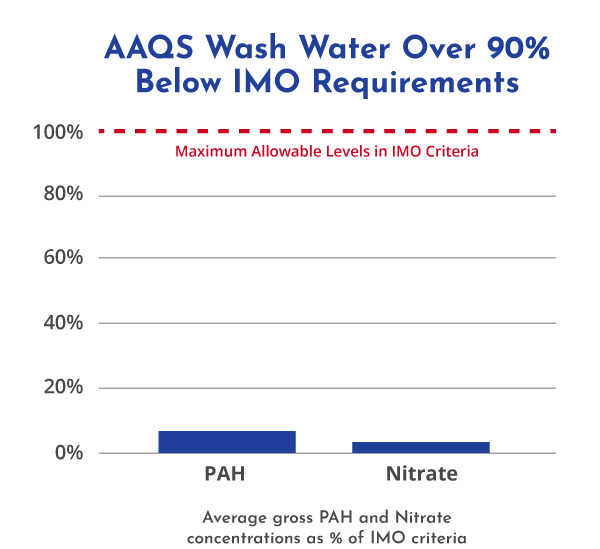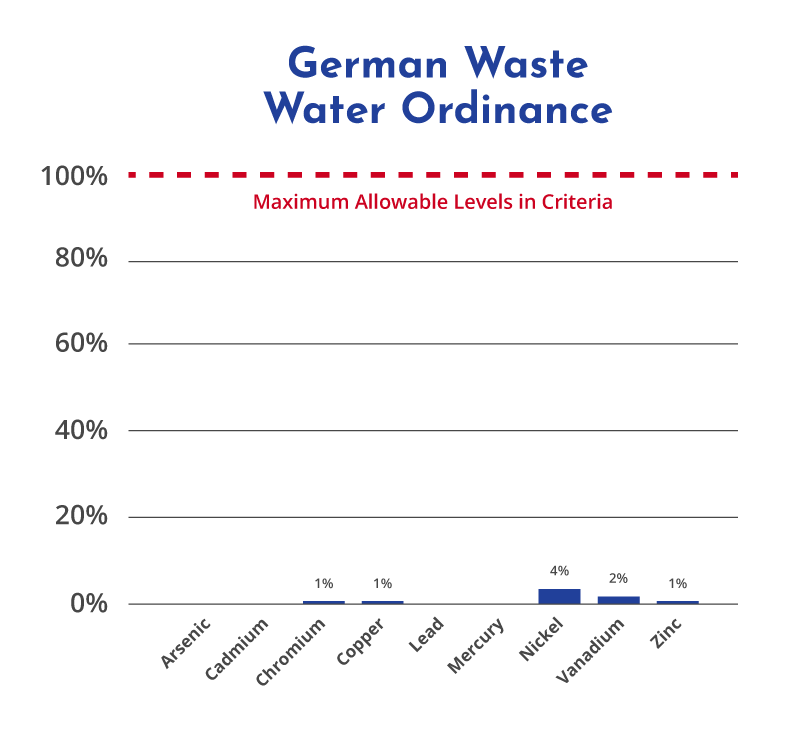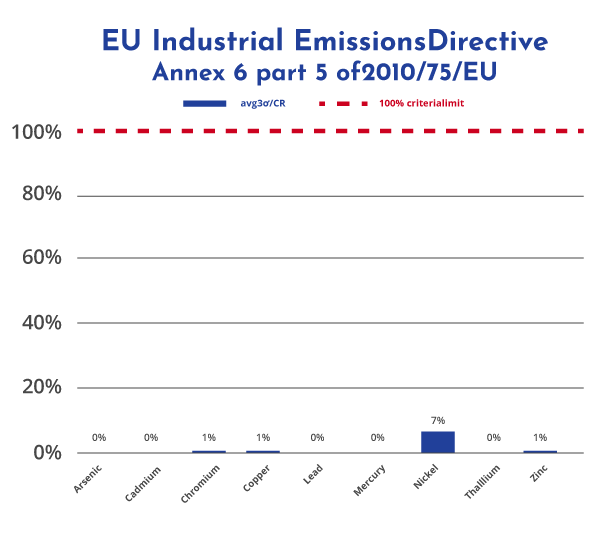Environmental Performance
learn more
Benefits of Advanced Air Quality Systems
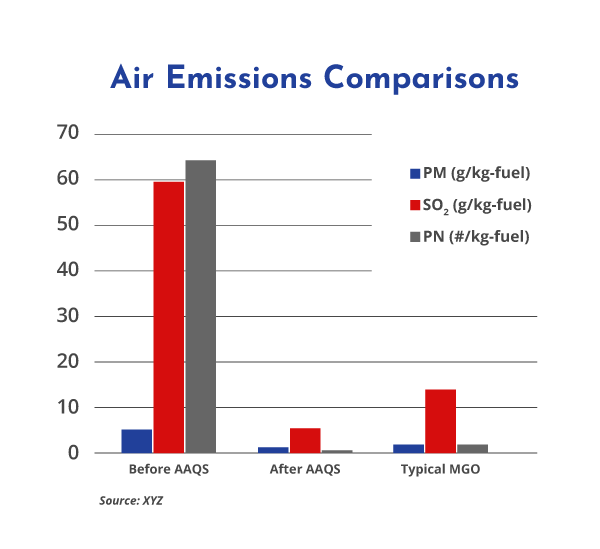
Advanced Air Quality Systems have the proven capability to outperform low-sulfur fuel alternatives such as MGO, providing overall cleaner air emissions in a way that is safe and effective for ocean environments. Results of extensive testing show that ships using Advanced Air Quality Systems produce emissions lower in sulfur and particulate matter (PM) than those running on low-sulfur MGO, a fuel consisting exclusively of distillates that is considered the benchmark for the IMO 2020 0.50 percent sulfur cap restriction.
In keeping with even the highest international standards, Advanced Air Quality Systems remove 99 percent of sulfur and 60 to 90 percent of PM from engine emissions, including elemental and organic carbon. It also reduces nitrogen oxides by 10 percent. Research shows scrubbers like Advanced Air Quality Systems are especially effective in capturing small-size PM (10 and 2.5 microns and ultrafine), while removing most of the soot from airborne distribution, including black carbon.
In late 2018, Carnival Corporation and the EPA received the results of the latest rounds of extensive exhaust emissions tests of the company’s Advanced Air Quality Systems. The results are consistent with the major published research on this subject, such as a 2014 study by researchers in Sweden, Kent Salo and Erik Fridell, which concluded that scrubbers on ships using HFO can lower PM to a level below that of MGO.
Because marine diesel engines were factory-configured for HFO, they are less efficient on MGO, leading to more CO2 released per unit kW power generated. HFO requires less refining than highly-refined MGO, which also means less greenhouse gas created during production. And, HFO has a lower combustion temperature than MGO, resulting in less nitrous oxides (NOx) production at sea.
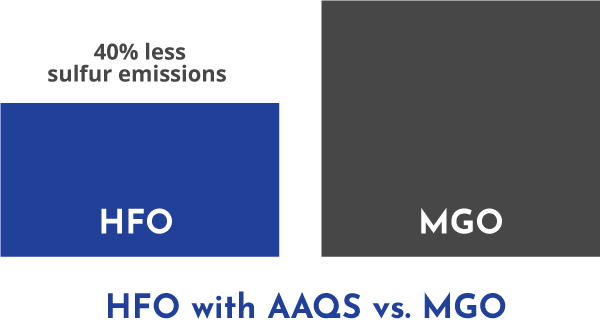
Ships operating with Advanced Air Quality Systems have the benefit of removing sulfur from fuel – keeping it from being released into the air – and returning it to the sea, which is the world’s primary natural reservoir for sulfur. The end result of the Advanced Air Quality Systems process is sulfur dioxide (SO2) being converted into water (H2O), air (CO2) and sulfate (SO4), a compound that is naturally occurring in abundance in seawater.
When the global maritime bunker fuel sulfur limit falls in January 2020 from 3.50 percent to 0.50 percent, there is uncertainty in the market as to whether there will be sufficient compliant low-sulfur fuels available in 2020. A number of refinery modelling experts say it will be challenging even if refiners make a concerted effort to meet demand from the marine sector. Industry experts believe that implementing this global fuel specification change will create pressure on supply. If these forecasts are accurate, the use of scrubber systems will be an even more crucial component in the shipping industry’s ability to comply with IMO 2020 regulations.
Performance Results
An independent, two-year scientific study of Advanced Air Quality Systems wash-water samples concluded that Carnival Corporation ships operating with Advanced Air Quality Systems consistently meet or even outperform the industry benchmarks established by organizations such as the IMO, European Union (EU) and the U.S. Environmental Protection Agency (EPA). The wash water from these systems is also well below the limits set by several major national and international water quality and land-based water discharge standards, even when compared to criteria like drinking water.
The study’s third-party results were conducted by DNV GL, one of the world’s leading classification societies and a recognized advisor to the maritime industry. After completing its analysis of laboratory tests of wash water samples, DNV GL concluded that the Advanced Air Quality Systems wash-water samples – known in the industry as exhaust gas cleaning systems (EGCS) or “scrubbers” – were below applicable limits set by several major national and international water quality and land-based water discharge standards to provide further proof of the quality and safety of the wash water, even when compared to ultra-strict parameters like drinking water.
Focused specifically on analyzing the composition and quality of Advanced Air Quality Systems wash water, the two-year study included 281 wash-water samples from 53 Advanced Air Quality System-equipped Carnival Corporation ships, creating the largest wash-water data set in the marine industry.
The samples were analyzed for 54 parameters by independent laboratories accredited by the International Organization for Standardization (ISO), using all standardized EPA methods. Following the lab phase, DNV GL reviewed the laboratory test data, comparing the results to major point source discharge limits and water quality standards.
Specific to IMO wash-water requirements, the study confirmed results from previous studies showing the quality of the water used in the Advanced Air Quality Systems process was always far below the IMO monitoring limits for polycyclic aromatic hydrocarbons (PAHs) and the annual limits for nitrates. In fact, when measured against IMO standards, the average wash-water test results in this study were over 90 PERCENT lower than maximum allowable levels. In many cases, the materials were completely undetectable in the laboratory testing process.
Additionally, the report compared the samples to selected national and international water quality benchmark standards, including the German Waste Water Ordinance, the EU Industrial Emissions Directive and Surface Water Standards Directive, and the World Health Organization’s (WHO) drinking water guidelines. The Advanced Air Quality Systems test results compared favorably with all of these major benchmark standards, demonstrating that the composition of the water was not only safe, but in most cases, significantly below the most stringent limits.
To read the full study, click here.
Third-Party Validation
To date, every significant and scientifically valid primary research known on the use of Advanced Air Quality Systems has come to the same conclusion – these innovative systems play an important role in compliance with upcoming IMO regulations and other standards for ship operations.
In fact, Japan’s Ministry of Land, Infrastructure, Transport and Tourism released a report in February 2019 strongly supporting scrubbers as a safe and effective option for IMO 2020 compliance. The report found that the ability of scrubber systems to remove airborne PAH and particulate matter (PM) makes them preferable to ships burning LSFO (or marine gas oil). Looking at 21 different PAHs and eight heavy metals, the study also found the impacts on water quality and marine life to be negligible. The report is available here.
For more scientific studies regarding the use of Advanced Air Quality Systems, please click here.
